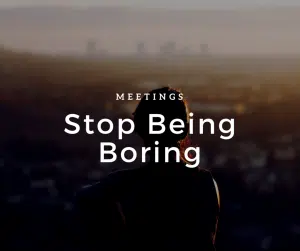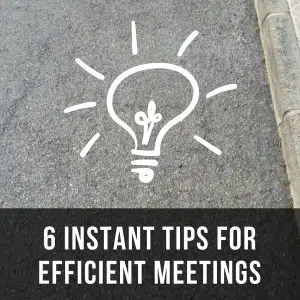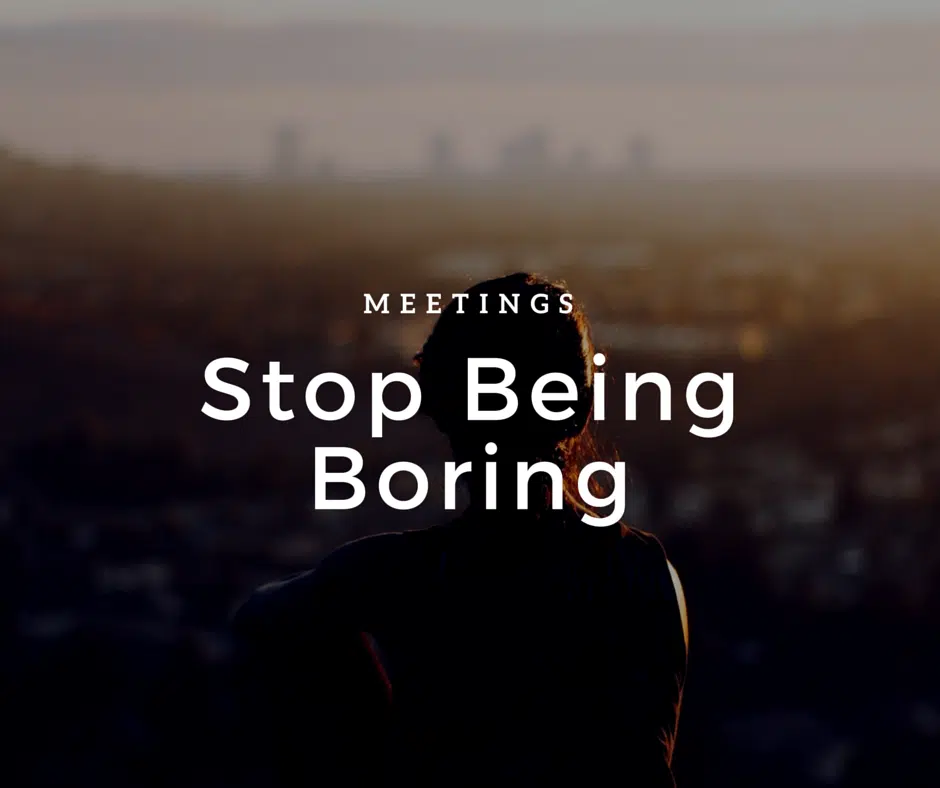Real Meeting Efficiency
Is it worth to blog about meeting efficiency … AGAIN?
YES I think it is … and yes it is ABOUT TIME!
NO, this isn’t another list of tips for better meetings.

The truth about meeting efficiency
Face it: Whether it’s a team meeting or a business meeting, people still waste a lot of time just by the way they conduct the meeting.
Well, I think the reason why there is so much to read about meeting efficiency is that it really is an issue for a lot of people: people do waste time in meetings, there is no doubt. But there is also no doubt about that most people already know how to avoid unproductive meetings.
So the real question is: why is it so hard to run meetings efficiently, although almost everyone thinks they know how to do it right?
To answer this question let us first sum up the rules for efficient meetings. I collected these rules and recommendations from various blogs on the internet. (You’ll find the links to some good articles at the bottom of this posting.)
Before we start, let me make clear that the following tips and tricks for efficient meetings only apply for typical business meetings, team meetings, project status meetings, recurring management meetings, etc. They do not hold true for brain storming sessions, employee meetings, etc.
6 Tricks for more efficient meetings

6 essential tips for meeting efficiency
Just to start from the same point of view let me sum the most important rules below:
#1 Don’t meet 🙂
Before inviting people to a meeting, ask yourself: what would happen if I skip this meeting?
When you skip a one-hour meeting with 5 people, you save 5 hours of productive work time. But what if there are good reasons to meet? Did you try hard enough to get the desired results through alternative ways, i.e. without conducting a meeting?
Once you defined the desired outcome of the meeting, ask if a meeting is the best way to get the desired result. If not, consider other methods, like email, chats, splitting up the topic into smaller / shorter stand-up-meeting, etc. Meetings are best when face-to-face interaction is absolutely essential, e.g. a performance review or re-energizing a group. But on the other hand, just giving instructions or checking on progress usually does not require a meeting.
You should think about meetings being very valuable time. If there is no valuable result in return…. don’t meet!
#2 Be clear on the objectives and encourage preparation
If you are not clear about the objectives of the upcoming meeting then it’ll be a waste of time. So if you are the host, be precise and clear about the agenda. And even more important: HAVE AN AGENDA 🙂
Furthermore share the agenda minimum 2-3 days in advance, so your attendees have a chance to prepare for the meeting. Encourage the attendees to prepare the meeting by assigning small tasks to them. For example: ask for suggestions, opinions, solutions, ideas, etc.
Increase your meeting efficiency by repeating the objective(s) for the meeting and ask for feedback from all participants.
If you are a participant, try to convince your host that it’s going be a waste of time, unless the objectives are clear and understood by every participant.
#3 Shorten your agenda to the absolute minimum
Try to boil down your meeting to the absolute minimum and most important topics you need to talk about.
Keep it short … and I say short! If you cram in all ideas and topics into one big multi-hour meeting, people will get tired and you will have a big problem with following up on all results.
Consider that each topic of your agenda should be prepared by each participant. So your long agenda will also result in extra work for your participants.
#4 Who needs to attend?
And yes … maybe you already experienced a situation where people got angry because they weren’t invited to a meeting. Don’t care about them! The truth is: only invite people who really can contribute to the result.
Informing people about the results can be easily done via e-mail or meeting apps. So again: double-check who you invite to a meeting. Stick to a minimum of participants. This not only saves the time of people who do not attend, it also brings you to the desired meeting result much quicker.
Also, you want only the absolute minimum of people attending. If multiple topics are important to different people, try to split your meeting into shorter parts and invite only the relevant people. This will also reduce the number of topics per meeting.
Don’t get me wrong on this: I like brainstorming. I like other opinions. But I don’t like these endless discussions. Meetings should be about results, tasks and decisions – that’s it, and nothing more!
#5 Follow up
So the meeting is over. Now what? Hope for the best? No, certainly not.
First: Let all attendees know about the results. Write and share the meeting minutes (via email, meeting apps, etc.). Make it visible to everyone involved.
I know that writing meeting minutes is cumbersome. But it’s the most important thing about meetings. The transparency of results helps you and your organization to benefit most from your meetings. It reduces the risk of misunderstandings about tasks and decisions.
Without a summary, most of the meetings’ results will certainly get lost. Your team needs to see the decisions and which tasks have been assigned.
Furthermore: If tasks are identified, assigned and scheduled (of course) you need to follow up on the progress in reasonable intervals. Still, you want to avoid annoying your colleagues by pressuring too much on this.
You think this is not necessary or even annoying? If people learn that tasks are not followed up, they might start dropping tasks. Eventually, this will double your problem.
#6 Establish a hard time-frame
This is the simplest one. Be tight on the schedule. Begin the meeting exactly at the scheduled time. Starting late inadvertently penalizes the punctual participants, while you reward the late-comers. Start in time, event if not all attendees are there yet. That will make a strong point. If you repeat this method for the next few meetings, you will train your attendees to be on time.
The same applies to the end of the meeting: the meeting is over at the time scheduled. People are always busy. Therefore, you’ll frustrate them when you finish late, because they will have problems with there upcoming meetings or tasks.
Furthermore, think about the meetings’ objectives. If you covered them sufficiently, summarize the results and then finish. People love meetings which end earlier than planned, because they just won valuable time!
Remember: Meetings are about results. That’s it. It’s not about spending time together.
Now what? How to be really efficient?
So you say: “I already know about these rules? And still, your meetings are inefficient, frustrating or boring?”
Let me come back to my point that there are other reasons why meetings are still inefficient.
#1 Too many informational meetings
I think that people have too many meetings. Especially in larger organizations, there is a high number of recurring meetings. These meetings tend to have a rather informational character. Usually, they are not run to drive decisions or assign tasks. Of course, some of these organizational meetings still are needed to keep people informed and motivated. And yet most of the information presented in these meetings could as well be sent via e-mail or posted on a intranet blog.
#2 Bad Moderators
Another idea is that although moderators knows about the 6 tips for efficient meetings, they still not obey to them consequently. So knowing about the rule is one thing – living these rules is yet another thing. So it’s about training to be a good meeting moderator. And of course, having the will to be a good moderator is also important.
#3 No priority for meetings
The foremost reason for bad meetings is that the moderator didn’t take the time for a good and timely preparation. In our hasty times, people don’t get (or take) the time to prepare their meetings sufficiently. Or in other words, meetings do not get the attention they need to have.
Meetings are rather an unloved necessity than the chance to drive important decisions, or steer projects.
Meeting efficiency: It’s all about priorities
Therefore I say: it’s about priorities. Although this might sound unfair if your boss and colleagues swamp you with tasks and meetings. You simply do not have the time to cope with all of these. Therefore again, I want to stress the point that setting the right priorities helps. You sometimes need to drop some tasks or meetings to gain the time for the really important things.
This brings us to a very difficult question. How do you know what’s important? Well, that is something you have to discuss with your boss. Now it becomes rather tricky: if your boss suffers the same problem he or she won’t have the right answers for you. But yet, it’s worthwhile to ask. Why? Well, it’s the job of your boss to give you the right guidelines and priorities for your job.
Summary
There are further reasons why meetings tend to be inefficient, but I’ll spare that for further blog posts.
I tried to summarize the most important tips & tricks for efficient meetings. They sound simple and yet are so hard to obey:
- Check whether you need to meet at all. Perhaps there are other ways to achieve the same result (like chat, email etc.)
- Have an agenda with clear objectives. Share your agenda in advance with your participants. Motivate them to prepare themselves to the meeting
- Shorten your agenda to the absolute minimum
- Shorten the list of attendees to the absolute minimum
- Write and share meeting minutes and followup on tasks
- Start and end on time. Bonus points for finishing even earlier
I am sure that there are further tips you may have to improve meeting quality. I’d love to hear them. So please comment your ideas on this blog post.
But the real question I wanted to address: What is the real reason lots of meetings are a waste of time, although people already know about the rules summarized above?
I found at least the following 3 reasons:
- Too many (unnecessary) meetings
- Bad moderators who know, but ignores, the meeting rules above
- Wrong priorities
Again, I am sure you’ll have some comments on my point of view. And again I’d love to see your thoughts on this!
Further reading
Finally, here’s a list of worth-reading blog posts on meeting efficiency, where I got some ideas to write this post:
- Seven Steps to Running the Most Effective Meeting Possible (by Neal Hartmann)
- 7 Tips on Effective Meetings (by Keith Morton)
- Seven Rules for More Effective Meetings (by Mark Hyatt)
- 14 Tips For Leading A More Effective Meeting (by Forbes Coaches Council)
